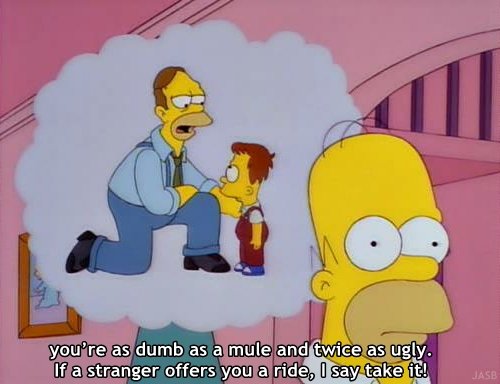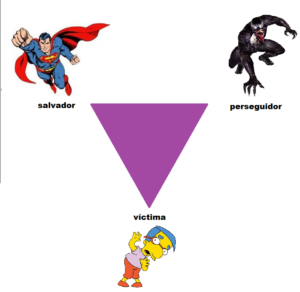The not so fun games we play [Psychology] [english]
What would you think if I told you that you can constantly be trapped in the game in which you did not know you were participating, that you are part of it, but you do not know it and that you repeat the cycle over and over again?

Source
Take a look at the following conversation
Player one: Sometimes I feel that I will not be able to do anything good with my life
Player two: Of course he has achieved a lot and he continues to do it because you are wonderful
Player one: But I'm bad at work, and at any moment they bounce.
Player two: You are not, tomorrow you put me to help you with whatever you have doubts.
Player one: It's a job that a long time ago, it would not give you time.
Player two: I'll try to get there earlier and help you.
Player one: And you have the key to the office so you can enter?
Player two: We could see that the guard cannot open earlier
Player one: Did you do something like the guard? Are you aware that you are helping me? Do not you realize the problem that causes me?
Player two: Excuse me, I did not know...
Player one: That's the problem, never the consequences...
Player two: I was just trying to help you, do not bother.
Player one: Thanks!... That great help.
Player two: I do not know what happened to try to help me and it went wrong, everything always goes wrong.*
First of all, to explain how this game happens, why it happens and why it is repeated, I have to talk to you before the transactional analysis that was one of the postulates of the theorist Eric Berne.
What is transactional analysis? (Sometimes I feel like a child, as a parent an adult depending on the situation)
Transactional analysis tries to explain the social actions that we maintain when relating to others, it could be seen as the classic stimulus and response. A verbal or non-verbal communication is a transaction, this theorist calls it that because when we relate to each other we want to obtain something and, therefore, we make an exchange with others.
But it happens that in these transactions people are not always static or behave all the time in the same way, so Berne established different ego states. The Father (F), the Adult (A) and the Child (C).

Source
The father is the one who transmits beliefs, morals, traditions, and culture. It speaks of the duty to be, it is dogmatic, it is protected and in its exaggerated version, it can be critical and punitive or overprotective.
Data for curious our state The father has been formed through the relationship with our parents, therefore, depends on the type of parents who have had in childhood can be shown in your state (F) someone who encourages or criticizes, which is mocking and hurts others, which will make our ego state a Nutritious Parent or a Critical Parent.

Source
The Adult is the calculator, collects data coldly to get solutions. It is our rational part.
Data for the curious: Berne believes that the Adult is lodged in the neocortex of our brain.

Source
The Child represents the attitudes learned since our childhood, it is, in essence, the search for our most basic satisfactions. And through him, our most elementary emotionality, fear, joy, sadness. Is reflected.
Data for the curious: The state the child will also depend on the child's upbringing, if in the process of teaching norms the child is constantly repressed, his / her State (C) will be that of an Adapted child that is submissive and shows handicap or can become otherwise, rebellious to the point of not accepting rule and wanting to be selfish.
All our states are complementary, a clear example, a person who lacks the parent state may not know how to treat others because he does not have the empathy to seek to understand and be someone's support, and the state of the children is fundamental for our creativity.
When there are difficulties?
The transactions can be complementary when they are made between two equal states, which makes it fluid. It can also be cut when they are of the cross type, as, for example, in a conversation between the states of the child and the adult. The problem occurs when the adult State is contaminated with one of the other States, and although it is apparently talking to the Adult, the intentions of the child or the father are actually hidden.
And the game begins...
It is there when the games begin. For Berne, they are cheating because in it there is a bet placed by player one, and a weakness that makes player two begin to play. First of all, player one acts from the handicap, a message that is addressed to player two who will try to solve the problem from the Father State, but the conversation is not cut because it takes an unexpected turn causing the roles to be exchanged. This is better known as the Dramatic Triangle of karpman, where there is always a victim, a hero and a persecutor and finally the victim ends up becoming a persecutor and the victim-hero, being trapped in a meaningless game.

Source
Let's look again at the previous conversation and to see how the game operates
[Adapted child] Player one: Sometimes I feel that I will not be able to do anything good with my life (bait)
[Father] Player two: Of course, you have achieved a lot and you will continue doing it because you are wonderful (frailty)
Player one: But I'm bad at work, and at any moment they throw me out. [Victim]
[Overprotective Father] Player two: You are not, tomorrow I will help you with whatever you have doubts. [Hero]
Player one: It's a job that takes a lot of time to do, it would not give you time.
Player two: I'll try to get there earlier and help you.
Player one: And do you have the key to the office so we can enter?
Player two: We could see if the guard can open us earlier
Player one: And you're going to make the guard know that you're helping me. Do not you realize the problem you're going to cause me? (Changing Roles)
Player two: Excuse me, I did not know ... [Victim]
Player one: That's the problem, you never measure the consequences ... [Tracker]
Player two: I was just trying to help you, do not bother.
Player one: Thanks!... That great help.
Player two: I do not know what happened, I tried to help you and it went wrong, everything always goes wrong.*
Can you leave the game?
The answer is not so simple, that is why I will explain it in more detail in the next post, I hope that this has been to your liking and that you have instructed them a bit about the complex mind and conduct to human.
Thank you for reading!
References
Rafael Sáez Alonso. The psychological games according to the transactional analysis.
Your Post Has Been Featured on @Resteemable!
Feature any Steemit post using resteemit.com!
How It Works:
1. Take Any Steemit URL
2. Erase
https://3. Type
reGet Featured Instantly – Featured Posts are voted every 2.4hrs
Join the Curation Team Here | Vote Resteemable for Witness
@steem-untalented
Good work!
Congratulations! This post has been upvoted from the communal account, @minnowsupport, by Ninistar from the Minnow Support Project. It's a witness project run by aggroed, ausbitbank, teamsteem, theprophet0, someguy123, neoxian, followbtcnews, and netuoso. The goal is to help Steemit grow by supporting Minnows. Please find us at the Peace, Abundance, and Liberty Network (PALnet) Discord Channel. It's a completely public and open space to all members of the Steemit community who voluntarily choose to be there.
If you would like to delegate to the Minnow Support Project you can do so by clicking on the following links: 50SP, 100SP, 250SP, 500SP, 1000SP, 5000SP.
Be sure to leave at least 50SP undelegated on your account.